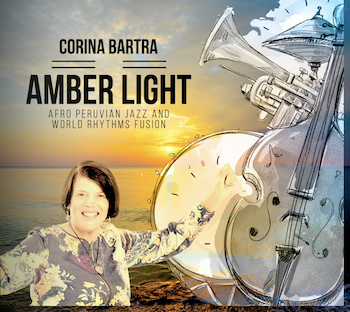Jazz Album Review: Corina Bartra’s “Amber Light” — Unlistenable? Or Genius?
By Allen Michie
Others may hear a painfully flawed Latin jazz album, but what I heard was a brilliant postmodern ironic jam session in the mode of Ornette Coleman. I’m probably wrong, but I don’t care, because this album is a blast.
Amber Light – Corina Bartra (Blue Spiral)
Ready to update the cult canon?
 I love Amber Light by Corina Bartra, but it’s probably for all the wrong reasons. The record that Bartra and her musicians meant to create isn’t, I expect, what I perceived going through my ears. Singer/percussionist/composer Bartra is an established musician in her native Peru, working on the edges of jazz and a variety of South American traditions. The subtitle of Amber Light is, accurately, “Afro Peruvian Jazz and World Rhythms Fusion.” Others may hear a painfully flawed Latin jazz album, but what I heard was a brilliant postmodern ironic jam session in the mode of Ornette Coleman. I’m probably wrong, but I don’t care, because this album is a blast.
I love Amber Light by Corina Bartra, but it’s probably for all the wrong reasons. The record that Bartra and her musicians meant to create isn’t, I expect, what I perceived going through my ears. Singer/percussionist/composer Bartra is an established musician in her native Peru, working on the edges of jazz and a variety of South American traditions. The subtitle of Amber Light is, accurately, “Afro Peruvian Jazz and World Rhythms Fusion.” Others may hear a painfully flawed Latin jazz album, but what I heard was a brilliant postmodern ironic jam session in the mode of Ornette Coleman. I’m probably wrong, but I don’t care, because this album is a blast.
This record is difficult to describe, to put it mildly. Imagine The Shaggs if they had been from Peru and were into Fela Kuti. Or if Florence Foster Jenkins sang vocalese to Don Cherry solos with Brave Combo on Antonio Carlos Jobim tunes. Or if someone did a mashup of Etron Fou Leloublan, Ronald Shannon Jackson, and Caetano Veloso. Or if Captain Beefheart ate too many picarones, fell asleep, and dreamt of Betty Carter riding a llama. However you describe it, you need to pick up a copy of this self-produced record before it becomes a collector’s item.
I don’t want to sound overly intellectual or patronizing — I really don’t. But the sound waves are what they are, and Bartra’s singing is so bad that it’s unlistenable unless you decide that it’s genius. Her signature is spending much of the time at least a whole step flat. Her intonation is a bit like how MacArthur Genius Grant winner Mary Halvorson plays the guitar. It’s in tune until it isn’t, then it really isn’t, then it stumbles back up again and recovers. It has some of the same destabilizing effect of Halvorson’s guitar: it certainly keeps you from sinking into the passive warm bath listening mode that’s common in so-called World Music. You’re not going to hear this one playing in the background at your local Pier 1 store.
The (what I will call) avant-garde singing wouldn’t work unless the rest of the band is in on it, and they are. I think. Everyone appears to have been studying Ornette Coleman’s harmolodic musical concepts, which includes dissolving the distinction between soloist and accompanist, and the key or “tonal center” evolves and shifts around as the group collectively improvises. At times, the percussionist seems to be playing in a different time signature, and the guitarist solos happily away regardless of whatever else is going on. Sometimes Bartra joins in with wordless vocals, starting and stopping when the spirit moves her. Listen to Bartra’s “Samba que le da” and then Coleman’s “Theme from a Symphony,” and see if I’m wrong.
Bartra composes half of the songs on the album. “Ebano Sky” starts with a jaunty melody with vocals and soprano sax, then the polyrhythms kick in. Bartra scats with Peruvian syllables, it dips into free Coleman territory for a moment, the taut rhythms get draggy, and it ends with a catchy little melody unconnected with the rest of the tune.
The complex polyrhythms are one of the album’s delights. “Carambas Si” starts off a bit like a slow polka if it were done by slightly intoxicated Peruvian jazz musicians. The song ends after two minutes, there’s a pause, then it begins again with a completely different tempo and melody. (Track error on the CD programming, or postmodern pastiche? You decide.) There are more polyrhythms, then more again, and the wordless vocals are swirling and smearing to wherever Bartra feels like going in the moment. A coherent melody floats in from time to time to keep things grounded. It’s fun to imagine a puzzled Sonny Rollins blowing over something like this.

Corina Barta — this record is difficult to describe, to put it mildly. Photo: Facebook.
“Wave” is a relatively straightforward bossa nova tune, respectful of Antonio Carlos Jobim’s composition. There’s some nice acoustic guitar from Wesley Amorim, who stays in the pocket and in the genre, but plays with a rougher edge and harder attack than you’d expect. No one will mistake Bartra for Astrid Gilberto. Her intonation is awful, but because Jobim’s songs are so often polished to a comfortable sheen, the performance works by going against the grain. You’ll hear “Wave” again for the first time.
There’s a Carlos Santana feel to Bartra’s “Latino Blues,” both from the “Oye Cómo Va”” rhythm and the sound of Amorim’s electric guitar solo. The drums are loose, the feel peters out toward the end, there’s a free-floating bridge that doesn’t quite know where to land, and you get to hear Bartra reach for the high notes (Robert Browning’s quote “Ah, but a man’s reach should exceed his grasp, or what’s a heaven for?” comes to mind).
“Azúcar de Caña,” by Kiri Escobar, has soothing acoustic guitar played against the polyrhythms in the percussion and vocals, and all three seem to be playing different songs most of the time. It comes together, it falls apart, then it comes together again. There’s a sleepy groove, in no particular hurry to get wherever it’s going. So often Latin music is Dynamic! With razor-sharp horn sections! Driving percussion! Blazing tempos! Staccato exciting vocals! This is the opposite of all that. If you want the same-old, same-old fantastic stuff, you know where to find it.
“Azure Sky” has contrapuntal bass work with a busy samba line from the infinitely tolerant Noah Garabedian (who can walk the line between inside and outside jazz, as he does on “Puente de los Suspiros”). It’s a relatively restrained song, although Bartra still does her Yoko-Ono-on-a-Carribean-cruise-ship-that-got-lost-and-refueled-in-Peru-but-ended-up-in-Morocco thing in the wordless vocals.
We get to hear Dave Morgan’s lush tenor sax on Bartra’s “Magenta Moon,” but the romantic mood lasts for less than a minute before the textures shift, the excellent polyrhythms begin to stack up, and cajón player Pedro Perico Díaz claims the song for his own. I swear there’s a snippet of the “Addams Family” theme done Latin at the end. Because why not? Remember back when this started as a lush romantic ballad?
Ah, then there’s the pièce de resistance, Stephen Sondheim’s “Send in the Clowns.” It’s been a while since I laughed out loud at a song. The vocals are hilariously bad. To my ear, it sounds like there are several time signatures and keys alternating or overlapping. I don’t think she’s being ironic, but it becomes a masterpiece if you decide to hear it like that: the song is really about driving the clowns the hell away. A second chorus goes into what sounds like a different (and better) song with a Latin/Middle Eastern fusion acoustic guitar vamp, and maybe others can hear a shadow of the chord changes to “Send in the Clowns,” but I can’t. Instead, I hear Indian modes in the wordless vocals. When we get back to the song in the final chorus, it’s in a completely different rock-based rhythm. This is instantly my new favorite version of this cloying, over-familiar song. It’s long past time to give the nonsensical lyrics the musical treatment that fits them. (My love for this track led me to Bartra’s album of jazz standards, with Kirk Lightsey on piano, Corina Bartra Quartet, where songs like “In My Solitude,” “Midnight Sun,” and “Gone With the Wind” are put through Bartra’s filter. The drums swing, the percussion is Peruvian, the guitarist is soloing to some other song in his head rather than accompanying per se, and Bartra kind of swings and kind of doesn’t.)
Amber Light is admittedly more lima bean than Lima. You may think it’s the worst album of the year. Just maybe, though — if you can let go of your preconceptions and let the music flow on its own idiosyncratic terms — you’ll think this is one of the most creative, hilarious, innovative, unpretentious, complex, uninhibited, jamming, liberating, and fun records you’ve heard in ages.
Allen Michie works in higher education administration in Austin, TX.
